科普版六年级下册lesson5 第一课时 let's talk导学案
小学英语PEP六下 U5A let's talk

Unit5第一课时教学设计备课教师备课组学校上课年级课题名称上课时间马剑镇小六年级U5 What does he do?教学内容 A Let’s try Let’s talk教学重点难点重点是掌握四会句型What does your father/mother/he do? He/She is a/an...难点是能够听、说、认读拓展句型What are you going to be? I am going to be a/an... 能够在语境中理解生词country, head teacher的意思,并能正确发音。
教学目标定位认知目标:1. 能够听、说、读、写主要句型:What does your father/mother/he do? He/She is a/an…并能在实际情景中熟练运用。
2. 能够掌握二会单词country,head teacher.理解三会句子:Do you want to be a head teacher, too? 并能在情景中正确运用。
3. 能够独立完成Let’s try部分的练习。
能力目标:能够灵活运用所学句型在真实情景中进行真实交流,能够用正确的意群及语音、语调朗读对话。
情感目标:在对话交流中使学生养成用英语交流的习惯,培养学生良好的语音语调和语感。
教学设计说明本课用表演做动作的形式在预热阶段就调动了学生的学习兴趣,同时又给学生提供了复习旧知识的机会,趣味性的练习使学生学英语不再单调,更利于学生接受。
本课的另一个特色就是根据教学内容进行拓展,在不影响教学进度的前提下,适当加以拓展,既调动了学生的积极性,又让学生了解到了许多课堂以外的信息。
板书设计Unit 5 What does he do?What does he do?He is a businessman.What does your mother do?She is a head teacher.What are you going to be?I am going to be a/an ...教学设计教学步骤教师活动学生活动建议说明Step 1: Warm-up 1、Preview教师出示与职业相关的道具,如粉笔、白大褂、棒球等,让学生猜。
科普版六年级下册Lesson 5教案(公开课)第三课时

【教学参考】第三课时教案(1)复习检查A.复习第四课的单词〔对于不同要求的单词采取不同的方法〕。
B.用所学的语言结构和交际用语进行自由对话。
(2) Revision exercises第5题:根据所给句子完成对话。
答案:1-6 cedbaf第6题:写出与所给词相对应的反义词。
答案:1. small 2.dirty 3.out 4.under 5.stand 6.down 7.tall 8.happy 9.cold 第7题:仿照例句写句子。
答案: 1.I watched TV yesterday.2.I visited a friend yesterday.3.I wrote a letter yesterday.4.I took some photos yesterday.5.I made a kite yesterday.6.I did some shopping yesterday.(3)阶段检测教师可根据教材第31页的表格,考查学生对四会单词以及语言结构的掌握情况,考查形式可为听写单词、师生对话等。
教师可自行组织设计。
(4)布置作业预习新课。
第二课时1.确保学生认识和理解一些根本单词的意义和简单口头运用,需要掌握的单词:farm,easy, interesting, kind, policeman, manager, choose, cleaner, which, on a farm 。
2.学习使用本单元重点句型及表达,掌握句型:What do you do?I am a ...Where do you work?Iwork …3.教师引导学生注意介词 on 和in 的准确运用。
【能力目标】学会询问对方的职业和工作的地方,并做到熟练运用。
【情感目标】鼓励学生大胆发言及表达,培养学生对英语学科的兴趣。
【教学重点】学会询问对方的职业,并做到熟练运用。
【教学难点】学会询问对方工作的地方,以及相应搭配介词的运用。
科普版-英语-六下-Lesson5. What will you do tomorrow教案
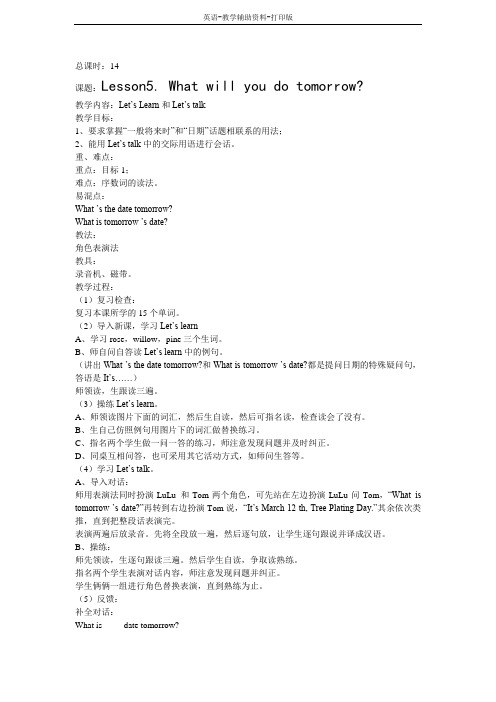
总课时:14课题:Lesson5. What will you do tomorrow?教学内容:Let’s Learn和Let’s talk教学目标:1、要求掌握“一般将来时”和“日期”话题相联系的用法;2、能用Let’s talk中的交际用语进行会话。
重、难点:重点:目标1;难点:序数词的读法。
易混点:What ’s the date tomorrow?What is tomorrow ’s date?教法:角色表演法教具:录音机、磁带。
教学过程:(1)复习检查:复习本课所学的15个单词。
(2)导入新课,学习Let’s learnA、学习rose,willow,pine三个生词。
B、师自问自答读Let’s learn中的例句。
(讲出What ’s the date tomorrow?和What is tomorrow ’s date?都是提问日期的特殊疑问句,答语是It’s……)师领读,生跟读三遍。
(3)操练Let’s learn。
A、师领读图片下面的词汇,然后生自读,然后可指名读,检查读会了没有。
B、生自己仿照例句用图片下的词汇做替换练习。
C、指名两个学生做一问一答的练习,师注意发现问题并及时纠正。
D、同桌互相问答,也可采用其它活动方式,如师问生答等。
(4)学习Let’s talk。
A、导入对话:师用表演法同时扮演LuLu 和Tom两个角色,可先站在左边扮演LuLu问Tom,“What is tomorrow ’s date?”再转到右边扮演Tom说,“It’s March 12 th, Tree Plating Day.”其余依次类推,直到把整段话表演完。
表演两遍后放录音。
先将全段放一遍,然后逐句放,让学生逐句跟说并译成汉语。
B、操练:师先领读,生逐句跟读三遍。
然后学生自读,争取读熟练。
指名两个学生表演对话内容,师注意发现问题并纠正。
学生俩俩一组进行角色替换表演,直到熟练为止。
(5)反馈:补全对话:What is date tomorrow?It’s March 12th,Tree Day。
PEP人教版小学英语六年级下册Unit 5 What does he do A Let's talk》优课教学设计.doc
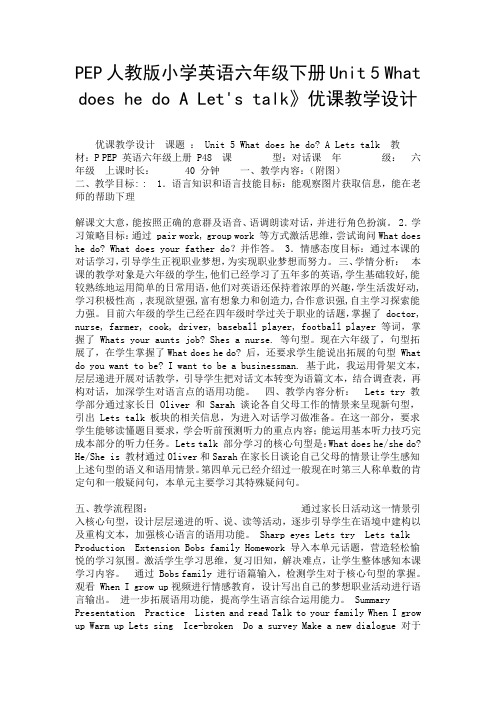
PEP人教版小学英语六年级下册Unit 5 What does he do A Let's talk》优课教学设计优课教学设计课题: Unit 5 What does he do? A Lets talk 教材:P PEP 英语六年级上册 P48 课型:对话课年级:六年级上课时长: 40 分钟一、教学内容:(附图)二、教学目标: : 1.语言知识和语言技能目标:能观察图片获取信息,能在老师的帮助下理解课文大意,能按照正确的意群及语音、语调朗读对话,并进行角色扮演。
2.学习策略目标:通过 pair work, group work 等方式激活思维,尝试询问What does he do? What does your father do?并作答。
3.情感态度目标:通过本课的对话学习,引导学生正视职业梦想,为实现职业梦想而努力。
三、学情分析:本课的教学对象是六年级的学生,他们已经学习了五年多的英语,学生基础较好,能较熟练地运用简单的日常用语,他们对英语还保持着浓厚的兴趣,学生活泼好动,学习积极性高 ,表现欲望强,富有想象力和创造力,合作意识强,自主学习探索能力强。
目前六年级的学生已经在四年级时学过关于职业的话题,掌握了 doctor, nurse, farmer, cook, driver, baseball player, football player 等词,掌握了 Whats your aunts job? Shes a nurse. 等句型。
现在六年级了,句型拓展了,在学生掌握了What does he do? 后,还要求学生能说出拓展的句型 What do you want to be? I want to be a businessman. 基于此,我运用骨架文本,层层递进开展对话教学,引导学生把对话文本转变为语篇文本,结合调查表,再构对话,加深学生对语言点的语用功能。
四、教学内容分析: Lets try 教学部分通过家长日 Oliver 和 Sarah 谈论各自父母工作的情景来呈现新句型,引出 Lets talk 板块的相关信息,为进入对话学习做准备。
科普版-英语-六下-Lesson5 What will you do tomorrow教学设计
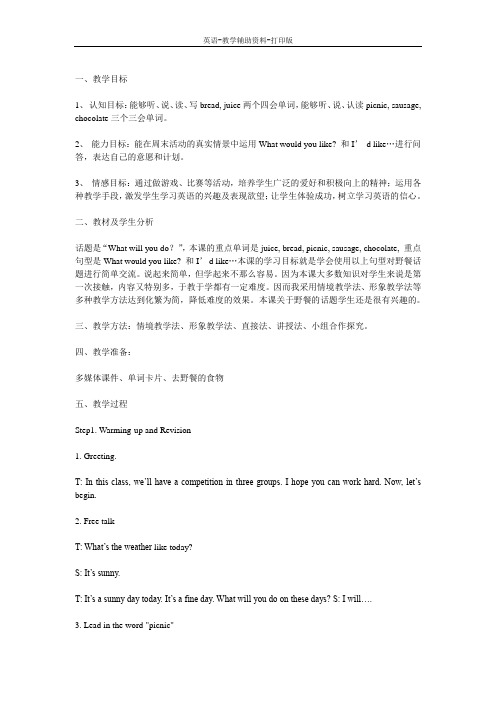
一、教学目标1、认知目标:能够听、说、读、写bread, juice两个四会单词,能够听、说、认读picnic, sausage, chocolate三个三会单词。
2、能力目标:能在周末活动的真实情景中运用What would you like? 和I’d like…进行问答,表达自己的意愿和计划。
3、情感目标:通过做游戏、比赛等活动,培养学生广泛的爱好和积极向上的精神;运用各种教学手段,激发学生学习英语的兴趣及表现欲望;让学生体验成功,树立学习英语的信心。
二、教材及学生分析话题是“What will you do?”,本课的重点单词是juice, bread, picnic, sausage, chocolate, 重点句型是What would you like? 和I’d like…本课的学习目标就是学会使用以上句型对野餐话题进行简单交流。
说起来简单,但学起来不那么容易。
因为本课大多数知识对学生来说是第一次接触,内容又特别多,于教于学都有一定难度。
因而我采用情境教学法、形象教学法等多种教学方法达到化繁为简,降低难度的效果。
本课关于野餐的话题学生还是很有兴趣的。
三、教学方法:情境教学法、形象教学法、直接法、讲授法、小组合作探究。
四、教学准备:多媒体课件、单词卡片、去野餐的食物五、教学过程Step1. Warming-up and Revision1. Greeting.T: In this class, we’ll have a competition in three groups. I hope you can work hard. Now, let’s begin.2. Free talkT: What’s the weather like today?S: It’s sunny.T: It’s a sunny day today. It’s a fine day. What will you do on these days? S: I will….3. Lead in the word "picnic"T: Guess, what are they doing?S: They are having a picnic.Help the students to read the word "picnic".T: Shall we have a picnic? Let’s have a picnic! OK?S:OK!T: We will take some things. There are so many things on the screen. I like some apples. What food and drink do you like?S: I like….T: I will have a picnic too. I will take some things. Look! This is my bag. Guess: What food and drink do I have for my picnic?S: Do you have some…?T: Yes, I'd like….T: We have so many things for our picnic. I think we will be happy.【设计意图】通过自由对话,游戏活动来激发学生的学习兴趣,活跃课堂气氛,复习旧知,引出新知,也为学习新知做好铺垫。
教育科学出版社小学英语三年级起点六年级下册 Let's talk 精品
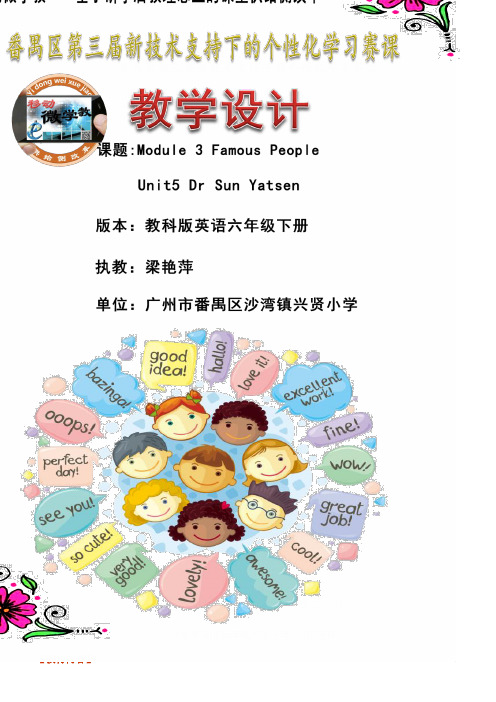
Module 3 Famous PeopleUnit 5 Dr Sun Yatsen 听说课教学设计广州市番禺区沙湾镇兴贤小学梁艳萍【教材内容】教科版义务教育教科书六年级下册Unit5 Dr Sun Yatsen【教材分析】本课是教科版小学英语六年级下册Module3 Unit5 Dr Sun Yatsen的第二课时听说课。
本模块的话题是Famous People,主要谈论的是中外名人的出生时间,地点,职业及贡献等相关知识。
其中Unit5是有关三个国外和三个国内名人。
通过争当小小讲解员,展开介绍名人。
本Unit的第一课时先让学生初步体验,学习职业和贡献的单词,并用He/She was a/an…介绍名人的职业,He/She介绍名人的贡献。
而本课作为第二课时,巩固第一课时的知识并让学生将这些知识综合运用起来,就介绍名人进行更高层次、更全面、更深入的介绍。
从整套教材体系看 Famous People 这个话题,它并不是孤立的,与之相关的话题有三年级上下册的人物及外貌;四年级上下册的人物外貌、性格职业、活动;五年级上下册的能力、爱好等等。
因此本课会重现旧知,以简单、轻松的方式围绕话题展开学习,为孩子们提供更充分的语用材料,让孩子们有话可说,并为本模块继续拓展介绍名人,谈论自己感兴趣的名人,积累更多的语言素材,为接下来的写话学习打下铺垫。
【教学理念】1. 教学供给侧改革学习理念。
以移动技术支持学与教的活动,以研学后教理念,大数据思想为基础,以课堂教学供给侧改革思想为指引,通过课内外为学生提供优质的学习资源与服务,促进传统课堂的转型升级,在提升课堂教学效率的同时实现教学活动价值的追求。
在教法上通过学习数据的收集和分析,发掘学生普遍存在的共性问题和知识性问题,并根据这些问题制定更科学的研学问题,实现研学问题的升级。
2.翻转课堂,实现知识的二次建构。
通过在家个性化学习微课,网上互动探究对如何介绍名人进行第一次知识建构;通过数据支持精确分析学情后,在课堂上交流、总结、完善,对新知进行的第二次认知建构,有助提高学生的思维能力,最后让学生形成支持其终身可持续学习、发展的英语技能等英语核心素养。
科普版六年级下册英语第七课第一课时Let's talk
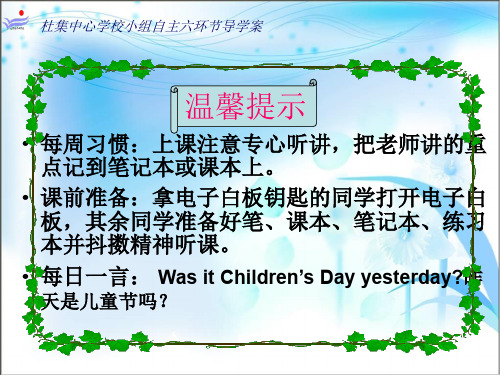
Was it Children's Day yesterday
G: Eve, what’s the date today? 伊芙,今天是什么日子? E: It’s June 2nd. 是六月二号 G: It was June 1st yesterday .昨天是六月一 号。 Was it Children’s Day? 昨天是儿童节吗? E: Yes, it was. 是的,昨天是。
• Was it Children’s Day? 是儿童节吗? • 此句肯定回答为Yes,It was. 否定回答为: No,it wasn’t. • Were you at school yesterday? • Were 是be动词are的过去式。 • 此句肯定回答:Yes,we were.否定回答: No,we weren’t. • 一般过去时态的陈述句变一般疑问句时, 将was或were提到句首即可。
天是儿童节吗?
Lesson 7
杜集中心学校小组自主六环节导学案
科普版六年级英语下册
第七单元第1课 Let’s talk 说一说
掌握一般过去时的肯定句, 一般疑问句及其回答 。
掌握对一般过去时时态的理解。 行为动词与动词be在过去时态的形式
杜集中心学校小组自主六环节导学案
预备页
• • • • • June /dʒu:n/ yesterday /‘jestədi/ Children’s Day meeting /‘mi:tiŋ/ sporting meeting 六月 昨天 儿童节 集会,会议 运动会
单词的过去式
• • • • was were did had /wɔz/ /wə:/ /did/ /hæ d/ am/is 的过去式 are的过去式 do的过去式 have的过去式
(完整word)科普版英语六年级全册课文(电子档)-推荐文档

Let’s talk(L=Lulu, T= Tom)L: What day is it today?T: It’s Wednesday.L: My birthday is coming.T: When is your birthday?L: Next Sunday.T: Are you going to have a birthday party?L: Yes, I am. I’m going to have a party at home next Sunday evening. Would you like to come? T: Sure. I’d love to. Are you going to ask Eve to come?L: Certainly.Make and sayA holiday planMay Day is coming. What are you going to do. Please tell me your plan.On May 1st, I’m going to visit my friends.On May 2nd, I’m going to take swimming lessons.On May 3rd, I’m going to help my mum do some washing.Read.Father’s birthday party.I’m Mary today’s my father’s birthday. The weather is good. It’s sunny. We are going to have a birthday party for him. Now my mother and I are doing some shopping. I'm going to buy some fruit. Mother is going to buy some eggs. She's going to make a birthday cake for my father. The party will begin at four o'clock. It's one o'clock now. And I’m asking my uncle and I and to come to the party.Let’s talk(E=Eve, D=Dongdong)E: What are you going to do tomorrow?D: I’m going to do some shopping.E: What are you going to buy?D: I’m going to buy a map of China.E: I want to buy some crayons. Can I go with you?D: Sure.E: How can we get there?D: By bike, OK?E: OK?ReadMr Going-to-doJohn lives in a village. But people often call him “Mr Going-to-do” . Do you want to know why? John always says,” I’m going to do...” But he never does it. Every Saturday, John goes to Mr Smith’s house and talk with him. “ I’m going to clean my house tomorrow,” he says, or “ I’m going to wash my car next week.” Mr Smith usually says, “ Are you, John?” John isn’t going to clean his house or wash his car. Mr Smith knows that. Then he says, “ Excuse me, John. I’m going to do some work now.” And he goes into his house. Mr Smith often says to his son, “ If you say you are going to do something, then do it. Don’t be another ‘ Mr Going-to-do’.”Lesson 3 It will be sunny this Sunday.Let’s talk(D=dongdong, L=Lulu)D: It’s nice outside, isn’t it?L: Yes, it is.D: What will the weather be like tomorrow?L: It will be cloudy and windy.D: Will it be cold?L: Yes, it will. But it’ll be sunny this Sunday.D: That’s good. I think it’ll be warm, too.L: Yes, I think so.D: What are you going to do this Sunday?L: I’m going to see my grandpa. And you?D: I’m going to play football.Listen and say(L=Lili, J=John)L: Hi, John! The winter holiday is coming. What are you going to do?J: We’re going to Australia.L: Wow! What will the weather be like in Australia?J: It will be sunny and hot. It’s summer in Australia now.L: That’s great! You can swim in the sea there.J: Yes, and what about you, Lili?L: I’m going to Hainan with my parents.J: Have a nice holiday!L: You too!ReadChanges in the weatherThe earth is getting warmer. In some places, the water in the sea will be hotter, and this will bring about great changes in the weather.There will be strong wind, and it will bring heavy rain to some places. And in some other places, the weather will be very dry. That will be bad for the people there. But it isn’t always bad. In some dry places the rain makes lakes full of water. Then birds come back again, and the people are very happy.Floods in China(中国洪灾)Forest fire in Australia (澳大利亚森林火灾)Forest fire in Indonesia (印度尼西亚森林火灾)Droughts in Africa (非洲大旱)Floods in Bangladesh (孟加拉国洪灾)Lake Nakuru in Kenya (充沛的雨水使肯尼亚基金干枯的纳库鲁湖重现汪洋一片,150多万只火烈鸟又回到湖边栖息)Lesson 4 What kind of books will you buy?Let’s talk(L=Lulu, H=Henry)L: What are you going to do tomorrow?H: I’m going to the bookshop.L: What kind of books will you buy?H: I’m going to buy some books about science.L: Science? Do you have science class this term?H: No, we have it next term. It’s new. Is it difficult?L: Yes, it’s difficult, but it’s interesting.H: Do you like it?L: Yes I do.ReadTreeIt is Tree Planting Day tomorrow. Many people will go up to the hills and plant trees.Trees can make the air clean. Animals and people can get food from them, too.But people are cutting down too many trees. That will bring about great changes in the weather. It will be too cold or too wet in some places. It will be too hot or too dry in other places.We must plant more trees. They will make the people healthy, and make our country more beautiful.Lesson 5 RevisionLet’s talk(A=Ann, Q=Qiqi)A: What will the weather be like tomorrow, Qiqi?Q: It’ll be sunny. What will you do tomorrow?A: I’ll go shopping.Q: What are you going to buy?A: I’m going to buy some food. Tomorrow is my birthday.Q: Are you going to have a party?A: Yes, I’m going to have a party tomorrow evening. Would you like to come? Q: Sure, I’d love to.Let’s talk(Q=Qiqi, L=Lulu, E=Eve)Q: Where is Kate?L: I think she is in the reading room.Q: Where is the reading room? Is it on the third floor?L: No, it’s on the fifth floor.Q: It’s Kate in the reading room.E: No, she’s in her classroom.Q: What class is she in?E: She is in Class Three.Q: Is it on the second floor?E: No, it’s on the fourth floor.Q: Thank you very much.Listen and say(N=Nick, L=Liu Mei)N: Liu Mei, is this your house?L: Yes. Come in, please.N: Wow! What a nice house. Where is your bedroom?L: It’s on the second floor.N: Do you have a study?L: Yes, I do.N: Where is it?L: It’s on the third floor. Come and have a look.N: Oh, so many books. Can I read this one?L: Sure.ReadFirst floor or second floor?Bruce and Jess are friends. They are in Class Three, Great Five. Bruce comes from the UK and Jess comes from the USA. They live in the same building in Beijing.“ I’m Bruce. I’m from the UK. I live on the first floor,” Bruce says.“ I’m Jess. I’m from the USA. I live on the first floor,” Jess says.“ Oh, you live on the same floor,” Lingling says.“ No, Jess leaves on the ground floor,” says Bruce.“ No, Bruce lives on the second floor,” Says Jess.“ I live on the first floor.” “ Bruce lives on the second floor.” Do you know why? Because in the UK “the first floor” is the same as “the second floor” in the USA.Let’s talk(Q=Qiqi, E=Eve)Q: What’s the date today?E: It’s April 30th.Q: Oh, my birthday is coming.E: When is your birthday?Q: It’s on May 5th. When is your birthday?E: My birthday is in May, too.Q: Oh, then we’re the same age.E: No, I’m twelve years old. And you’re ten years old. So I’m older than you.Listen and sayMom, I’m back. I’m hungry.There is a cake on the table. You can have it.Look, Mom! “Eat before May 20th.” What’s the date today?It’s May 22nd. So you can’t eat it. There is some bread in the fridge. Go and get some.OK, Mom.ReadThe number 13In the USA and the UK. Some people don't like the number 13. They don't think 13 is a good number. For example, they don't like to live on the thirteenth floor.It was May 4th, Jack’s birthday. He asked some of his friends to dinner. When everyone sat around the table, Jack began to count the people. Suddenly, he cried,” Oh, there are 13 people here!” Everyone was worried but Mrs Brown, Jack’s mother. She said slowly with a smile,” Don’t worry children. We have fourteen people here. I am going to have a baby in three months.”They all became happy again. They enjoyed the nice food and had a good time that night.Lesson 8 Merry Christmas!Let’s talk(N=Nick, B=Bess, D=Dad, M=Mum)N: It’s December 25th. It’s Christmas Day!B: Let’s say Merry Christmas to Mum and Dad.N: OK.B&N: Merry Christmas, Dad!Merry Christmas, Mum!D&M: Merry Christmas, children.M: Go to the sitting room and find your present.B: Oh, what a beautiful tree!N: Oh, the presents are under it.M: This toy dog is for you, Nick.D: The doll is for you, Bess.B&N: Thank you, Dad. Thank you, Mum.Listen and say(S=Son, M=Mum)S: Happy Mother’s Day, Mom! Here’s a card for you.M: It’s beautiful. Thanks.S: Thank you for your love, Mom. What can I do for you today?M: Nothing, Son.S: I’ll do the cleaning for you. You have a good rest.M: Oh! You’re a good boy.S: Thanks, Mum. I love you.ReadHalloweenIt’s October 31st. It’s Halloween. The kids are very happy.They are making masks. They are making Jack-O-lanterns. Then they dress up like ghosts.In the evening they go from door to door. They knock at the door of a house and cry, “ Trick or treat!” A woman comes out and gives them some candy. They thank her and go to another house.They knocked at the door and cry “Trick or treat! “ This time a tall ghost comes out. The kids cry “ Ah! A ghost! ” and run away.“ Don’t run away, ” the ghost cries. “ It’s just us. We are Bob and Rob. “ The kids all laugh.Lesson 9 Were you at school yesterday?Let’s talk(G=Grandpa, E=Eve)G: Eve, What was the date yesterday?E: Today is June 2nd. So yesterday was June 1st.G: It was children’s Day, wasn’t it?E: Yes, it was.G: Were you at school yesterday?E: Yes, I was.G: What did you do?E: We had a sports meeting.G: Did you have a good time?E:Yes, we did.Listen and say(W=Wang Li, T=Tom)W: Hi, Tom. How was your weekend?T: It was great! I went fishing with my father.W: Are you good at fishing?T: No, I’m not. But my father is. How was your weekend?W: It was OK. I was at home. My dog was ill. I had to look after her.T: Is she better now?W: Yes, she is much better. Thank you.ReadApril Fools’ DayIt was April 1st. A bus was going down a country road. Then it slowed down and stopped. The driver tried hard to start it, but he couldn’t.Then he turned to the passengers and said, “ This bus is too old. I can’t start it. Now we can only do one thing. I will count to three, and on the word three, I want you all to lean forward together. Then the bus will start again. “All the passengers said yes. and the driver began to say, “ One! Two! Three! “ When they heard “ Three ”, they all leaned forward hard, and the bus started again.When the driver said “ April Fools! “ , the passengers suddenly remember it was April Fools’ Day and they all began to laugh.Lesson 10 RevisionLet’s talk(A=Ann, Q=Qiqi)Q: What’s the date today, Ann?A: It’s May 31st.Q: Oh, tomorrow is June 1st. It’s Children’s Day.A: Yes. I want to make some cards for my friends.Q: Good idea. Can I join you?A: Certainly.(D=Dongdong, A=Ann)D: What was the date yesterday?A: Yesterday was April 11th. It was my birthday.D: How old are you?A: I’m twelve. What about you?D: I’m twelve, too.A: We are the same age. When is your birthday?D: It’s in May.A: Then I am older than you.ReadMy new home.My name is Liu Jun. I live in Shanghai. Now my family and I are driving to our new home. It’s in Pudong.We drove along some streets and over a bridge. At last we stopped in front of a tall building. Our new home is on the eighteenth floor. My bedroom is big and bright.From the window. I can see many cars and people down in the streets. They look very small. The cars look like toys.To the west, I can see the Huangpu River and many tall buildings along it.At night we watch the lights go on over the city. The lights look like stars in the sky. And the city is very beautiful. I like my new home.Lesson 1 I’m not feeling well.Let’s talk(M=Mom, T=Tom)M: What’s the matter, Tom?T: I’m not feeling well, Mom.M: Do you have a cold?T: Yes, I think so. Could you give me some water, please?M: Here you are.T: Thank you, Mom.M: Tom, you must go and see a doctor.T: OK, Mom.M: It’s cold outside. You must wear your coat.T: OK, Mom. Could you pass me my coat, please?M: Here you are.T: Thank you, Mom.M: Tell me your teacher’s number. I’ll call him and tell him you are sick.T: OK. Here it is.Listen and say(S=Sam, T=Tom)S: Hi, Tom. It’s Sam. There is a football game this afternoon. Do you want to watch it?T: No, thanks. I have a bad cold.S: Oh. You should drink plenty of water and stay in bed.T: Yes, I’m in bed now.S: You can watch the football game on TV.T: Yes, my father will be with me.S: That’s good!ReadA good habitDan often stayed up late and got up late. At last he became ill. He had a bad headache, and couldn’t get to sleep at night. So he went to see a doctor.“ Oh, you look tired. What’s the matter?” the doctor asked.“ I have a bad headache and can’t get to sleep at night,” Dan said.“ When do you usually go to bed?”“ I usually go to bed after 12 o’clock.”“ You should go to bed before 10 o’clock. Drink some milk before you go to sleep. I’m sure you will sleep well and get better soon.”From then on, Dan went to bed early and soon he got better.It’s a good habit to go to bed early and get up early.Let’s talk(L=Lulu, T=Tom)L: Hello, Tom! What do you usually do on Sunday afternoon?T: I often play basketball.L: Did you play basketball yesterday?T: No, I didn’t. I went to visit a friend.L: Did you have a good time?T: Yes, I did. My friend likes taking photos. He showed me many photos.L: Did you like the photos?T: Yes, I liked them very much.Listen and say(S=Sam, L=Lili)S: Hi, Lili! Glad to see you again! Tell me about your trip. Was it your first trip to London?L: Yes, it was. We visited Big Ben and Tower Bridge. We also went to Hyde Park.S: Wow! Sound great! Was the weather good?L: No, it wasn’t. It was wet. It rained every day. But the people there were very kind.S: Did you have a good time?L: Yes, we did.ReadThe giant’s gardenOnce there lived a giant. He had a big garden. There were many beautiful flower and trees in it. Birds sang in the trees and children liked to play in the garden.One day the giant came back after a long trip. He saw the children playing in his garden. He was very angry. He built a high wall around the garden. But from then on, it was always winter in the garden. There were no birds or flowers, and the trees were not green. The giant was very sad.One morning, the giant looked out and found many children playing in the garden. The trees were green and the birds sang again.The giant came out and said, “ It’s your garden now, little children.” And then he pulled down the wall.Let’s talk(M=Mary, D=Dali)M: What do you usually do on Sundays?D: I usually go boating or swimming.M: Did you go boating last Sunday?D: No, I went to Tiger Zoo.M: Great! How many tigers were there?D: There were about ninety.M: Did you see many of them?D: Yes. We were in a bus, and we could drive very near and have a good look at them.M: Oh! What fun! Do the tigers live a good life in the zoo?D: Yes. Tigers are rare in China. So people are doing their best to protect them.Mother koala and her baby.One day I was driving my car along the road in Australia. Suddenly the car in front of me stopped. I got out of my car to have a look.There were about ten cars in front of mine. “ What are they waiting for?” I thought.I walked up to the first car. What did I see? I saw a mother koala with a baby on her back. She wanted to cross the road, but she just sat down in the middle of the road.After some time, the mother koala got up and walked off the road. Then the car started to go again.koala are rare in the world. The Australians like them very much. They do their best to protect them.Look at the pictures below. These animals in China are rare, too. But are we all doing our best to protect them?red-crowned cranes 丹顶鹤giant pandas 大熊猫Northeast tiger 东北虎Tibetan antelope 藏羚羊Chinese alligator 扬子鳄Lesson 4 What did you do last Saturday?Let’s talk(L= Liu Jun, K=Kate)L: What did you do last Saturday?K: I went to the supermarket.L: Who took you there?K: My uncle.L: How did you go there?K: We went by taxi.L: What did you buy?K: My uncle bought me a red sweater. Look! This is the sweater!L: Oh, cool. It looks nice on you.K: Thank you.ReadCinderellaCinderella was a poor young girl. Her mother was dead. Her stepmother was bad to her. She made her do all the hard work.One day the Prince had a party to find a wife. Cinderella’s stepmother took her daughters to the party, but Cinderella had to stay at home. She was very sadJust then a fairy came up. She turned Cinderella’s clothes into a beautiful dress, and turned the pumpkin into a coach. “ Go to the party now, but you must come back before 12 o’clock.”At the party, the prince danced with Cinderella all evening. Soon the clock began to strike 12. Cinderella ran out quickly. On the way she lost one of her glass shoes.The prince told his men to find the girl. They asked all the girl to try the shoe on, but only Cinderella could put it on.Cinderella became the prince’s wife and they lived happily ever after.Lesson 5 RevisionLet’s talk(S=Sam, M=Miss Li)S: Miss li, I feel bad.M: What’s the matter sam?S: I think I have a cold.M: Oh, you should go to see a doctor.S: I think so.M: Don’t worry about your lessons. I help you.S: Thank you miss d.(L=Lily, J=Jack)L: What was the date yesterday?J: It was May 1st.L: What did you do yesterday?J: We went to the Great Wall.L: Did you have a good time?J: No, not very good.L: Why?J: Because it rained suddenly and we didn’t have umbrellas. We all got wet. L: What bad luck!Lesson 6 Is there a library near here?Let’s talk(L=Lulu, M=Mingming)M: Excuse me. Is there a library near here?L: Yes, there is.M: Are there any English storybooks in the library?L: Yes, there are.M: How can I get there?L: Go down this street. Turn left at the end. You can see it on the right.M: Thank you.L: You’re welcome.ReadAre you still looking for that place?It was Monday. Mr Black wanted Jack to go to London and give the letter to Mr Brown. Mr Brown’s office was next to a hospital.Now Jack was in London, but he couldn’t find the place, so he asked the way. “ Excuse me. Is there a hospital near here?” Jack asked an old woman. “ Yes, there is. Go down this street. Turn left at the end. The hospital is on the right.” The old woman answered.Jack found the place and gave the letter to Mr Brown.It was Friday. Mr Black wanted Jack to see Mr Brown again. He was in London, but he still couldn’t find the hospital. “ Excuse me. Is there a hospital near here?” Jack met an old woman and asked. That was the same woman. She was surprised and said, “ Are you still looking for that place?”Lesson 7 Where do the tigers come from?(G=Gao Tao, N=Nick, H=Helen)G: This is Beijing Zoo. There are a lot of animals here—elephants, bears, tigers and many others. N: Where do the tiger come from?G: They come from northeast China.N: What do the animals eat?G: Tigers and bears eat meat. Elephants eat plants.N: Are there any pandas here?G: Yes there are some. Look! There they are.N: Wow! They are lovely.H: Do pandas only live in china?G: Yes, they do. They are my favorite animals.N: We like them, too.H: Let’s take some photos of them.G: OK.ReadTom’s birthday party.Today is Monday. Next Sunday is Tom’s birthday. He wants to have a party.It’s Tuesday evening. Tom is writing some emails to his friends. He asked them to come to his party.Today is Thursday. Tom is talking to Lulu on the phone. He is asking her to come to the party.It’s Saturday morning. Tom is in a shop. He is buying some food and drinks.It’s Saturday afternoon. Dongdong and Lulu are in a shop. They are buying a present for Tom.Today is Sunday. It’s 7:30 inn the evening. Lots of friends come to Tom’s birthday party. They sing Happy Birthday to him. Tom is very happy.Lesson 8 Who are you going to play?(B=Buzz, D=Dongdong)B: It’s Sunday tomorrow. There’s going to be a football match between Japan and China.D: What time is it going to start?B: At three o’clock in the afternoon. I have two tickets here. Do you want to go with me?D: I’d love to, but I can’t. We are going to have a basketball match tomorrow afternoon.B: What a pity! Who are you going to play?D: A team from No. 2 middle school.B: Where were you going to play?D: At our school.B: Good luck to you and your team!D: Thank you.ReadThe weather in the UK.In the UK, people often talk about the weather. Why? Because the weather there often changes quickly. They can have four seasons in one day.In the morning the weather is warm, and it’s just like a spring day. An hour later, black clouds come, and then it rains hard like in summer. In the afternoon the sky will be clear, the sun will begin to shine, and it can be like a day in autumn. Then evening comes, and it can be cold like winter’s day.When you go to the UK, you will see some people going out with an umbrella on a sunny morning. You should not laugh at them. If you don’t take an umbrella or a raincoat with you, you may get wet in the rain later in the day.Lesson 9 I helped a deaf man to get home.Let’s talk(M=Mum, P=Peter)M: Why are you so late today, Peter?P: I helped death man to get home. He was lost.M: You did a good job, Peter.P: But Mum, he couldn’t hear. I really didn’t know how to talk to him.M: So how did you know where he lived?P: Another boy helped me. He knew some sign language.M: Oh, he’s a good boy, too.P: Yes, Mum. I think I should learn some sign language, so that I can help more people.ReadThe fisherman and go fish.Once there lived a poor fishermen. Every day he went to fish. One day he caught a goldfish. The fish said to him, “ Please let me go. I can give you anything you want.” The old man was kind and he let the fish go.He went home and told his wife about the goldfish. His wife got very angry and sad, ” I want a new dress. Go and find the goldfish.”The old man went back to the sea. He asked the goldfish for a new dress. The goldfish said yes.The man was happy to see his wife in a new dress, but his wife wasn’t happy. He wanted a big house. They asked the fish and they got a big house.But his wife was still not happy. This time she wanted to be the queen of the sea.The goldfish said, “ She wants too much. That’s too bad. “The fisherman went back and saw his wife in their old hut. She was in her old dress again.Lesson 10 Revision(D=Dali, J=John, Y=Yueyue)D: What are you going to do in the winter holiday, John?J: We’re going to visit Hong Kong.Y: You’ll love it! I went there two years ago. We had a great time.J: How long did it take you to get there?Y: It took about three hours to get there by plane.J: And which places did you visit?Y: We visited the Disneyland and the Ocean Park.D: How long did you stay in Hong Kong?Y: Four days.J: Wow, I hope to go to Hong Kong soon.ReadA trip around the world.My name is Jimmy. I’m a student. I live in Toronto, Canada.Last summer holiday, my parents and I went to the USA. We visited New York and Washington.Then we flew to the UK and visited the famous Big Ben in London.After that, we went to France and did some shopping in Paris. We had a great time.This summer we will go to Rome, the capital of Italian.From Rome, we will go to Moscow by plane. It’s the capital of Russia.Then we will fly to Beijing, the capital of China. We are going to climb the Great Wall and visit the Bird’s Nest.From China we will fly to Australia. We will visit Sydney there.Then my trip around the world will come to an end. I hope I can travel to the moon some day.。
科普版小学英语六年级下册Lesson 5 【教学参考】第一课时 教案

科普版小学英语六年级下册
【教学参考】第一课时教案
(1)复习检查
A.听写第一课和第二课的单词(对于不同要求的单词采取不同的方法)。
B.复习动词接双宾语结构的用法。
(2)导入新课
A.导入对话:本课对话可采用自问自答(或手指木偶)的方式导入,教师同时扮演萨姆和李老师两个角色,可先站在左边扮演萨姆说Miss Li,I feel bad.再转到右边扮演李老师说What's the matter,Sam?其余依次类推,直到把整段对话表演完。
表演两遍后放录音。
先将全段放一遍,然后逐句放,让学生逐句跟说并译成汉语。
第二部分的对话也可用以上方式导入。
(3)操练
可利用挂图进行操练。
操练的顺序是:
1)教师在挂图下写上关键词作为提示,让学生结合关键词听录音并逐句跟说。
2)教师领着学生复述一遍,再给学生两分钟时间,让学生自己根据关键词看图复述。
3)教师领着学生进行集体复述。
4)让学生单个复述。
5)教师将学生分成若干组复述全段对话,或者进行表演。
第二部分莉莉和杰克的对话也可按上述方式操练。
(4)布置作业
安排学生两人一组于课后练习该对话,下次上课时表演。
如果没有您爱的滋润,怎么会绽放那么多美好的灵魂之花!。
最新小学PEP人教版英语六年级下册B Let’s talk教学设计公开课导学案

1教学目标2学情分析3重点难点4教学过程4.1 第一学时教学活动活动1【导入】1小学英语晒课内容:人教版六下册第三单元B《Let’s talk》教材分析(活动背景、重难点)活动背景:学生在之前的单元学时的语法,用来询问之前在假期里发生的事,以及A部分John通过电话应答Amy和张鹏,说明自己没有上课的原因这一情境,来运用动词过去式描述已经发生的事情。
在这一课里,通过吴一凡和Amy在学校遇见Sarah,三人谈论Sarah寒假活动的语境来呈现新句型,可以说这一课的学习是对之前学过句型的一个综合运用。
重点:1、能够灵活运用:Howou go there? We went there by plane.继续注意一般过去时的用法。
2、能够表演并内化Let’s talk的交际内容。
难点:能够在真实的语境中灵活运用本课重点句型,并根据课文大胆创编对话。
学情描述六年级的学生对英语学习的兴趣整两极分化比较严重。
我们现在除了要分析学生的学习状况外,还需了解他们的学习习惯,包括上课听讲、记笔记、做作业以及复习等等。
比较准确的确定学习者的起点能力,可在一定程度上提高教学效率,收到良好的教学效果。
所以我们要充分认识学生,确定教学思路。
现在学生的学习渠道越来越宽了,他们在学习新知识前,已经有了相当丰富的生活经验和实践积累。
关键在于我们教师如何去充分估计和了解学生的这些已有积累作为学生的学习起点,促进学生的有效学习。
教学目标1、能够正确重点句型:Where did you go over the winter holiday? My family and I went to Sanya. How did you go there? We went there by plane. What did you do there? I took lots of pictures, and I also went swimming. Sounds great!2、能够正确听、说、认读如:be far from, by plane, took pictures, went swimming等。
科普版-英语-六下-科普版小学六下(第八册)英语教案lesson5 第一课时
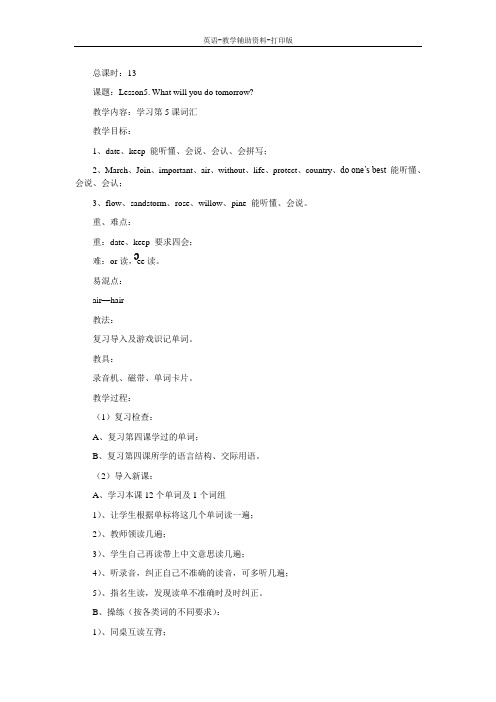
(2)导入新课:
A、学习本课12个单词及1个词组
1)、让学生根据单标将这几个单词读一遍;
2)、教师领读几遍;
3)、学生自己再读带上中文意思读几遍;
4)、听录音,纠正自己不准确的读音,可多听几遍;
5)、指名生读,发现读单不准确时及时纠正。
B、操练(按各类词的不同要求):
1)、同桌互读互背;
2)、出示单词卡片,让学生开火车背中文说英文;
3、flow、sandstorm、rose、willow、pine能听懂、会说。
重、难点:
重:date、keep要求四会;
难:or读,ee读。
易混点:
air—hair
教法:
复习导入及游戏识记单词。
教具:
录音机、磁带、单词卡片。
教学过程:
(1)复习检查:
A、复习第四课学过的单词;
B、复习第四课所学的语言结构、交际用语。
总课时:13
课题:Lesson5. What will you do tomorrow?
教学内容:学习第5课ห้องสมุดไป่ตู้汇
教学目标:
1、date、keep能听懂、会说、会认、会拼写;
2、March、Join、important、air、without、life、protect、country、do one’s best能听懂、会说、会认;
3)、让学生看英文说中文。
C、学习单词拼读规划:
1)、or读;
让学生找出本课出现的两个单词,并举出一些类似的词,让学生识记。
2)、ee读,方法同上;
3)、反馈:
听写单词:date、keep。
布置作业:默写本课单词
板书设计
Lesson5 What will you do tomorrow?
科普版六年级下册英语第三课第一课时Let's talk
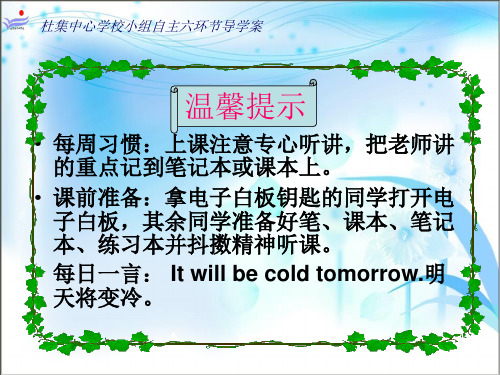
注意一、反义疑问句是疑问句的一种,它对陈述部分的事 实提出相反的疑问,形式上是一个省略问句,附加在陈述 句后,即: 陈述句 + 逗号 + 省略问句 + 问号 It’s fine , isn’t it ? You are from America, aren’t you? 注意二、遵循前否定后肯定或前肯定后否定的原则
• at all 是一个固定短语,意为:“根本,丝毫, 完全”,起加强语气的作用,常用于否定句 中,表示“根本不,一点儿也不”的意思。 即:not at all根本不,一点也不。
• I like summer. 我喜欢夏天。I love swimming. 我喜爱游泳。
• love在此处是动词,表示“爱好;喜欢”,相 当于like,但比like更富有感情色彩,表示强 烈的“爱”的情感。
• 今天天气很好。
• It is fine.
杜集中心学校小组自主六环节导学案
轻松演练
• I ____ like winter at all.
• A. don’t B. not
C. doesn’t
• 2.What’s the weather ___ today.
• A. like
B. with
C. for
• 我一点也不喜欢夏天。• I don’t like summer at
夏天太热了。
all. It’s too hot.
• 东东喜欢秋天。秋天 • Dongdong likes
凉爽。
autumn. It is cool.
• 今天的天气怎么样? • What’s the weather like today?
6下unit5第一课时教案

Unit 5 A party (period 1)一、教学内容Story time二、教学目标1. 知识目标:①能听懂、会说、会读和会拼写单词: clown, appear, put on, begin,②能听懂、会说、会读和会拼写句型:What are you going to bring to the party? I’m going to bring some toys. Are we going to eat or play with the toys first?2. 水平目标:通过课文重点语言知识点的学习,能理解课文内容,能自然流畅地给课文内容配音和表演。
三、教学重难点1.准确掌握,灵活使用将来时句型表达于真实情景中。
2.能理解,准确朗读,表演Story time,并能自编类似情景。
四、教学准备多媒体课件,图片。
五、教学过程Step 1: Preparation1.Greetings2.Free talk:What’s the weather like today?What festival do you like?3.Guessing game:Children’s DayT: Let’s have some fun first.根据描述来猜T: A holiday,in june, Children like it.Ss: It’s Children’s Day!3.Let’s chatWhat do you usually do on Children’s Day?导入本课重点句型:What are you going to do next Children’s Day?I’m going to ... ...Are you going to ...?4.work in pairs(操练将来时问答句)出示一些图片做参考S: I’m going to have a party.5.揭题:T:You are going to have a party.The children are going to have a party,too.(出示本课人物图片)Today we are going to learn Unit 5 A party.Step 2: Presentation and practice1.Can you ask any questions about the tittle?Ss:When?What?Who?Where? 引导学生提问 be going to ...2.Watch and answer(观看卡通,回答问题)解决学生提问When are they going to have the party?Where are they going to have the party?Who are going to take part in the party?3.Read and fill(Underline the key sentence.)4. Learn picture 2 and 3:(1) The way: T: The children have prepared for their party.It is Sunday morning. The children bring their things to Mike’s house. Let’s go and see. 展示课文图片2T:Are the children all here?Ss: No.T: I can’t find Liu Tao, can you see him? Where is he?Ss: We don’t know.T: Let’s wait and see(2)Learn picture 3The way: T: Just then, a clown appears.Show and read: clown appearsSs: Just then, a clown appears. 学生一起说,熟练这个句子Who are you?Clown: I’m Liu Tao. Here are some balloons for you.Ss: Thank you.5.Learn picture 4(1) the way: T: The children are all here,Now the party begins:What are they going to do first at the party?(2) Let’s guess: Are they going to ... first?S:Are they going to ...?Show: They are going to have some fun first.(3)Let’s imagine: What fun are they going to play?Ss: Maybe/Perhaps they are going to ...4.Watch and choose(据需观看动画,完成选择)1).The clown is ________.A.MikeB.Mike's cousinC.Liu Tao2).Liu Tao brings _________to the party.A.some toysB.some balloonsC.some vegetables3).The children are going to _______ first.A.play with toysB.eat the foodC.sing a song5. Learn to read: 注意声调降调以及重读。
六年级下英语教案-lesson5课题:Whatwillyoudotomorrow-科普版

六年级下英语教案lesson 5 课题:What will you dotomorrow科普版教学内容本课教学内容为科普版六年级下册英语第五课《What will you do tomorrow》。
本节课主要围绕将来的计划与安排进行教学,通过学习本课,学生能够掌握一般将来时的用法,学会用英语描述自己的未来计划,同时增强学生的英语口语表达能力。
教学目标1. 知识与技能:学生能够理解并运用一般将来时,描述未来的计划与安排。
2. 过程与方法:通过听、说、读、写的训练,提高学生的英语口语表达能力,培养学生的合作精神。
3. 情感态度与价值观:培养学生积极向上的生活态度,激发学生对未来的美好憧憬。
教学难点1. 一般将来时的构成及用法。
2. 描述未来计划的句型及词汇。
3. 提高学生的英语口语表达能力。
教具学具准备1. 教具:多媒体课件、黑板、粉笔。
2. 学具:英语课本、练习册、文具用品。
教学过程1. 导入:通过图片、歌曲或游戏等方式,引起学生对本课主题的兴趣,激发学生的学习热情。
2. 新课呈现:讲解一般将来时的构成及用法,展示描述未来计划的句型及词汇。
3. 实践环节:学生分组讨论,用英语描述自己的未来计划,并进行课堂展示。
4. 巩固环节:进行听力、口语、阅读、写作等方面的练习,巩固所学知识。
板书设计1. What will you do tomorrow?2. 重点句型:I will/won't3. 关键词汇:tomorrow、plan、activity、schedule等。
4. 课堂练习:根据提示用英语描述自己的未来计划。
作业设计1. 课后练习:完成练习册上的相关练习。
2. 口语作业:与家人或朋友用英语讨论并描述自己的未来计划。
3. 写作作业:写一篇关于自己未来计划的英语短文。
课后反思1. 教师在授课过程中,要注意关注学生的学习情况,及时调整教学方法和节奏。
2. 针对不同学生的学习程度,进行差异化教学,提高教学效果。
科普版英语六年级下lesson5 第一课时
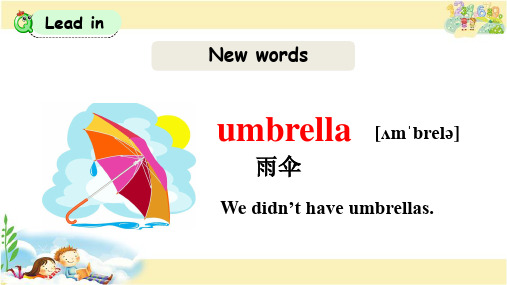
(S=Sam,M=Miss Li) S:Miss Li, I feel bad. M:What’s the matter, Sam? S:I think I have a cold. M:Oh. You should go to see a doctor . S:I think so. M:Don’t worry about your lessons. I’ll help you.
J:We went to Great Wall. J:Because it rained suddenly
L:Did you have a good time? and we didn’t have umbrellas.
J:No, not very good.
We all got wet.
L:Why?
What was the date yesterday?
It was May 1st.
What was the date yesterday?
It was March 8st.
Language points
知识点5 用来提出疑问,并做出回答的句型。
【教材原文】—Why? —Because it rained suddenly and we didn’t have umbrellas.
did what you yesterday do (?) _W__h_a_t_d_i_d_y_o_u__d_o_y_e_s_te_r_d_a_y____________?
and it suddenly we have didn’t umbrellas rained (.) __It_r_a_in_e_d__s_u_d_d_e_n_ly__an_d__w_e__d_id_n_’_t_h_a_v_e_u_m__b_r_el_l_as______.
六年级下Unit 5导学案
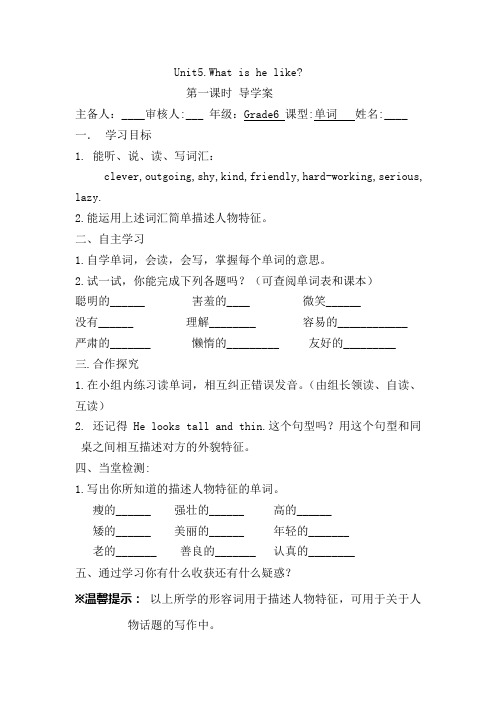
第一课时导学案主备人:____审核人:___ 年级:Grade6 课型:单词姓名:____ 一.学习目标1.能听、说、读、写词汇:clever,outgoing,shy,kind,friendly,hard-working,serious, lazy.2.能运用上述词汇简单描述人物特征。
二、自主学习1.自学单词,会读,会写,掌握每个单词的意思。
2.试一试,你能完成下列各题吗?(可查阅单词表和课本)聪明的______ 害羞的____ 微笑______没有______ 理解________ 容易的____________ 严肃的_______ 懒惰的_________ 友好的_________三.合作探究1.在小组内练习读单词,相互纠正错误发音。
(由组长领读、自读、互读)2. 还记得He looks tall and thin.这个句型吗?用这个句型和同桌之间相互描述对方的外貌特征。
四、当堂检测:1.写出你所知道的描述人物特征的单词。
瘦的______ 强壮的______ 高的______矮的______ 美丽的______ 年轻的_______老的_______ 善良的_______ 认真的________五、通过学习你有什么收获还有什么疑惑?※温馨提示:以上所学的形容词用于描述人物特征,可用于关于人物话题的写作中。
第二课时导学案主备人:____审核人:___ 年级:Grade6 课型:对话姓名:____一、学习目标1.能听懂并理解Let’s talk部分的对话内容。
2.能流畅地朗读对话,并在相关情景中运用以下句型:(1)What is he like?—He is kind to us.(2)What do you think of her?—She is a little serious. 二.自主学习1.预习Let’s talk部分的对话,会翻译。
2.试一试,你能完成下列各题吗?(1)She looks_____ _______ _______(又高又瘦)(2)What____you think of your mother?—She is____(善良的).(3)I like my math teacher,______(因为) he always made math____ ____ ______(容易理解)(4)It is easy_____ ______ ______(学英语)三.合作探究1.分角色朗读对话。
unit5六年级英语科导学案

小学六年级英语科导学案课题:Unit 5 What does he do? A. Let’s learn 课型:单词课课时:第一课时本周行为训练重点:训练学生在课堂上能大胆展示,培养他们的倾听能力。
学习目标:1.听懂、会说、正确读写单词:factory worker, postman, businessman, police officer2.能够运用主要句型询问某人的职业并作答“What does your father/mother do? He's/She's a/an…”Is your father a postman? No, he isn’t.3. 能对理想的职业提醒提问并作答“What are you going to be? I am going to be a/an…”学习重难点: 听懂、会说、正确读写单词:factory worker,postman ,businessman, police officer 能够运用主要句型询问某人的职业并作答“What does your father/mother do? He's/She's a…”Is your father a postman? No,he isn’t.教学过程一、知识链接1.冠词a和an 的用法:a 和an 都表示一个(条,只…). 在以辅音开头的名词前用a,例如a pen, a computer; 在以元音开头的名词前用an,例如an apple, an orange, an ice-cream, an egg等等。
2.单词what的简介:what 是一个特殊疑问词,常用来对事情事物进行询问,例如:What are you going to do on the weekend? I’m going to visit my grandparents.在本节的学习中,what 还有另外一种用法,主要对职业进行提问。
- 1、下载文档前请自行甄别文档内容的完整性,平台不提供额外的编辑、内容补充、找答案等附加服务。
- 2、"仅部分预览"的文档,不可在线预览部分如存在完整性等问题,可反馈申请退款(可完整预览的文档不适用该条件!)。
- 3、如文档侵犯您的权益,请联系客服反馈,我们会尽快为您处理(人工客服工作时间:9:00-18:30)。
杜集中心学校小组自主六环节学案设计人 2014年月日
六年级下册第5课What will you do tomorrow?你明天将干什么?
第一课时班组姓名
学习目标:
会听说读写以下单词: date 日期 March 三月 join 加入
教学重点:
在两分钟内背会并默写的短语:
on Tree Planting Day 在植树节那天 on the hills 在山上 Would you like to...?你愿意做....吗? see you.待会见.
教学难点:
会翻译一下语句:
1).What is tomorrow's date?
2).What do you do on Tree Planting Day?
3).Would you like to join us?
教学设计:
一、快乐自学:
1.自读文章,用红的笔圈出你所不认识的单词,短语和语句.
2.小组内解决组员所产生的问题,在解决问题过程中,若整个小组都不会的问
题,由学科组长举手,请教老师!
提示短语:on Tree Planting Day 在植树节那天 on the hills 在山上
Would you like to...?你愿意做....吗? see you.待会见.
3.再读文章,把整篇文章翻译出来!
二、合作探究:
通过小组讨论的方式,来理解文章中出现的以下知识点.
1).在植树节那天用介词______.
2).在山上_______.
3).we 宾格_______
4).they 宾格_______
5).Would you like to ...?回答是_______.
三、精彩展示:
1、由学科组长带头,其他组员跟读,再把文章读一遍.
2、背诵该文章.
四、点拨归纳:
• 1.重点短语:
•on Tree Planting Day 在植树节那天on the hills 在山上Would you like to...?你愿意做....吗?see you.待会见
• 2.重点语句:
•1).What is tomorrow's date?
•2).What do you do on Tree Planting Day?
•3).Would you like to join us?
五、轻松演练:
•翻译下面的短语.
• 1.在植树节那天_________
• 2.在山上____
• 3.would like to _________
• 4.待会见______
六、创新反思:
通过植树节有关对话的学习,大大激发了学生的学习兴趣,提高了学生的学习热情,收到了好的效果。
